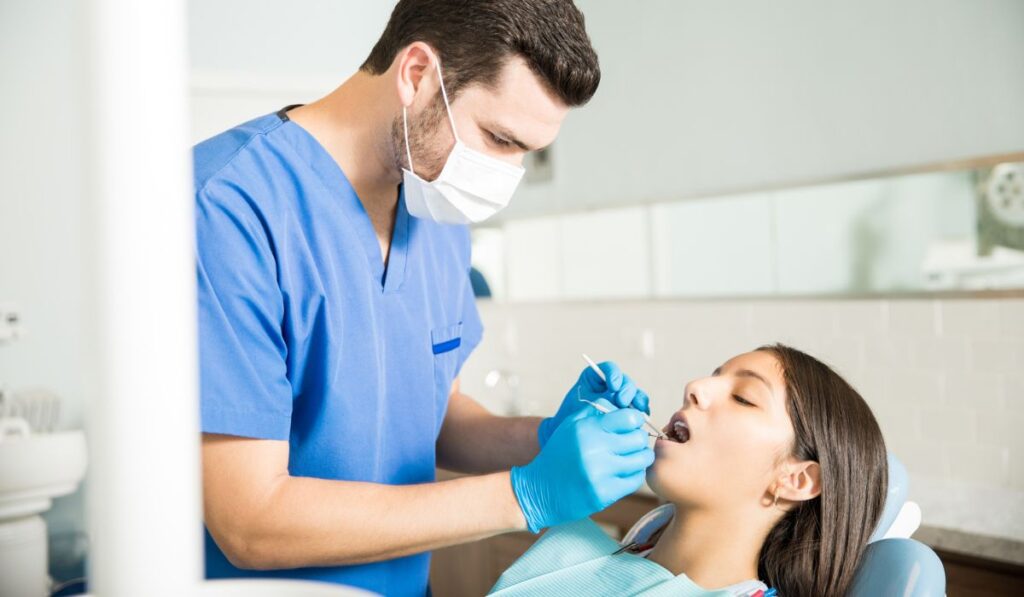Teeth sensitivity can be a pain, especially when it comes time to enjoy a delicious ice cream Sundae. But what happens when you suddenly find that you have tooth sensitivity when you’ve never had a problem previously?
Tooth sensitivity can come on suddenly. Usually, it is caused by a cavity forming, poor dental hygiene, or teeth grinding while sleeping. Even if the cause is believed to be benign, see a dentist right away to be sure and ensure the problem doesn’t get worse.
Worried your teeth sensitivity might be caused by something else? If so, let’s look at all the causes of tooth sensitivity and the best ways to remedy it at home.
What Causes Sudden Tooth Sensitivity?

If you wake up one day to find that your teeth are suddenly sensitive, a few different things could be causing it.
A Developing Cavity
Unfortunately, the most common cause of sudden tooth sensitivity is that you have a cavity developing. This could be because you don’t brush or floss your teeth well enough.
Once a cavity has begun to form, there isn’t much you can do to reverse it. So it’s better to see a dentist as soon as possible when this is the case.
Cracked Tooth
If you recently suffered an injury to your jaw or mouth, this could be causing your tooth sensitivity. For example, if an injury has cracked your tooth, it exposes the root, leading to sensitivity.
Having a cracked or damaged tooth is a very serious situation, and you should plan to see a dentist immediately if you suspect this is the reason behind your sensitivity.
Teeth Grinding
Teeth grinding is a common cause of tooth sensitivity. When you grind your teeth together, it causes you to wear down the top layers of your teeth and overload forces onto the surrounding bone, nerves, and pulp, causing them to become sensitive.
Brushing Your Teeth Too Hard
Weirdly enough, just as brushing too little can cause tooth sensitivity, so can brushing your teeth too hard or too much. When you brush your teeth too often or with too much pressure, this removes the enamel coating.
Once the enamel coating is no longer there to protect your teeth, they will become sensitive and may come on quite suddenly.
Gum Recession
When the gums recede for whatever reason, although usually caused by periodontal disease, poor oral hygiene care, or even improper brushing, it exposes the roots of your teeth, making them more sensitive.
How to Prevent Tooth Sensitivity
Just as there are several causes of tooth pain, there are also several ways to prevent your teeth from becoming sensitive. They are listed below for your reference.
- Brushing your teeth every day (two times!).
- Flossing every day.
- Using sensitivity relief toothpaste with fluoride (on Amazon).
- Using an extra soft-bristled toothbrush (on Amazon).
- Wearing a mouthguard at night (only if you clench or grind).
- Seeing your dentist routinely.
You must treat your teeth with the utmost care to prevent tooth sensitivity. This is because once your teeth have lost their enamel (or a cavity forms) and the tooth is sensitive, you generally need a dentist to help you correct it.
When Should You See a Dentist?

No matter what you think the cause may be when you start to have tooth pain or sensitivity, you must make an appointment with your dentist as soon as possible.
In most cases, you will need to take corrective action to stop your tooth pain, but there is a chance that you may have sensitive teeth. When this happens, a dental check-up is still needed to make sure. They may also recommend products to help with your teeth sensitivity.
If you forgo seeing a dentist, there is a huge chance your tooth sensitivity will get worse, especially if it is caused by a cavity or gum disease. It is always better to see a dentist sooner rather than later before the problem gets worse.
Final Thoughts on Why are My Teeth Sensitive
Overall, your teeth may be sensitive due to a number of factors. But regardless of why you think your teeth may be sensitive, it’s best to speak with a dentist immediately. They will help you get to the bottom of the problem and recommend the right solution.


